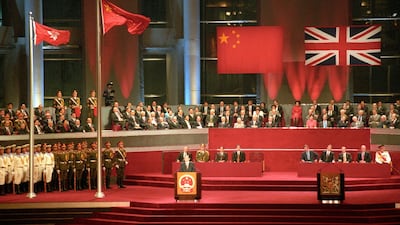Prosperity, stability and the international image of Hong Kong, also known as the “Pearl of the Orient”, has taken a major hit since protests, demonstrations and violent clashes escalated in China’s Special Administrative Region (SAR). The international community has been paying close attention to the situation, especially when Hong Kong International Airport was shut down due to unlawful assembly and violent obstruction. Etihad, Emirates and other airlines had to delay or cancel hundreds of flights, affecting a large number of travellers including many friends from the UAE. One has to ask: what is going on?
On July 1, 1997, the Government of the People’s Republic of China resumed the exercise of sovereignty over Hong Kong, after more than a century of British colonial rule. In order to resolve Hong Kong’s historical overhangs and maintain its long-term prosperity and stability, the principles of “One Country, Two Systems”, “Hong Kong people administering Hong Kong” and a high degree of autonomy in the SAR have been fully implemented ever since. Hong Kong has continued to be a centre for international financial services, trade and shipping, and the world’s freest economy for over 20 consecutive years. The people of Hong Kong enjoy unprecedented democratic rights and a broad range of freedoms. What’s noteworthy is, during the 156 years of British colonial rule, Hong Kong had 28 Governors, none of whom were elected, while the past 22 years since its return have witnessed 4 Chief Executives elected. All can be accredited to the success of “One country, Two systems”.
It all started from an ordinary case. In February 2018, Chen Tongjia, a Hong Kong resident, was suspected of murdering his pregnant girlfriend in Taiwan before he fled back to Hong Kong. As Hong Kong had no jurisdiction over this case, the SAR Government proposed amendments the relevant legislation in order to transfer Chen Tongjia to Taiwan for trial. Understandably, the SAR Government hoped to work better with other parts of China on the transfer of fugitives, jointly combat crimes, fix the loopholes in its legal system, and uphold the rule of law instead of being a “safe haven for fugitives”.
Unfortunately, a small group of people and media started campaigns to stoke panic and block the bill’s passage in the Legislative Council, leading to massive assemblies against the amendments in June. In order to solicit broader public opinion and to restore calm at an early date, the SAR Government decided on June 15 to suspend its work on the amendment bill. China’s Central Government supports, respects and understands this decision. Demonstrations and protests should have come to an end by then.
However, assemblies, protests and demonstrations soon exceeded their due limits, and turned into premeditated violence. They ransacked the Legislative Council, surrounded Hong Kong Police Headquarters, and disrupted tax and immigration authorities amongst others. They staged city-wide strikes and boycotted classes and business activities. They stocked up on massive explosives, and used toxic and harmful means to assail police. They paralysed Hong Kong International Airport and inflicted physical harm to a traveller and a journalist. Some even trumpeted “Hong Kong Independence”, besieged the Liaison Office of the Central Government, and defaced the national flag, national emblem and the SAR emblem. Such acts have flagrantly challenged China’s sovereignty and the bottom line of “One Country, Two Systems”. Ordinary people’s lives, safety and property are in jeopardy.
The recent violence in Hong Kong is intolerable in any civilised, rational society under the rule of law. During the riots, Hong Kong police have honoured their duties under huge pressure, and enforced the law with professionalism and great restraint. They have been a pillar in safeguarding Hong Kong’s security and the last shield to uphold social stability.
It is imperative to stop violence, end chaos and restore order in Hong Kong. China’s Central Government will continue to firmly support the Hong Kong SAR Government under Chief Executive Carrie Lam, the police, and the people who love both China and Hong Kong in upholding the rule of law and “One Country, Two Systems”. China will never allow any external force to interfere in Hong Kong affairs. No attempts to create chaos in Hong Kong or disrupt China will succeed. We are confident that with concerted efforts, dark clouds casting over Hong Kong will be dispelled eventually, and the blue sky will reappear.
Zhong Shi, Spokesperson of the Chinese Embassy in the UAE

